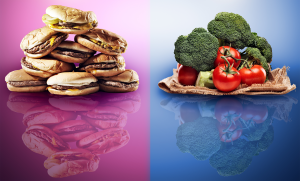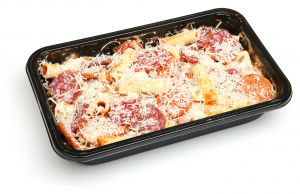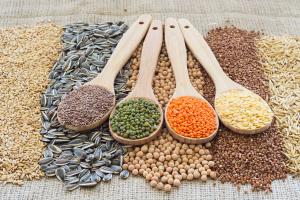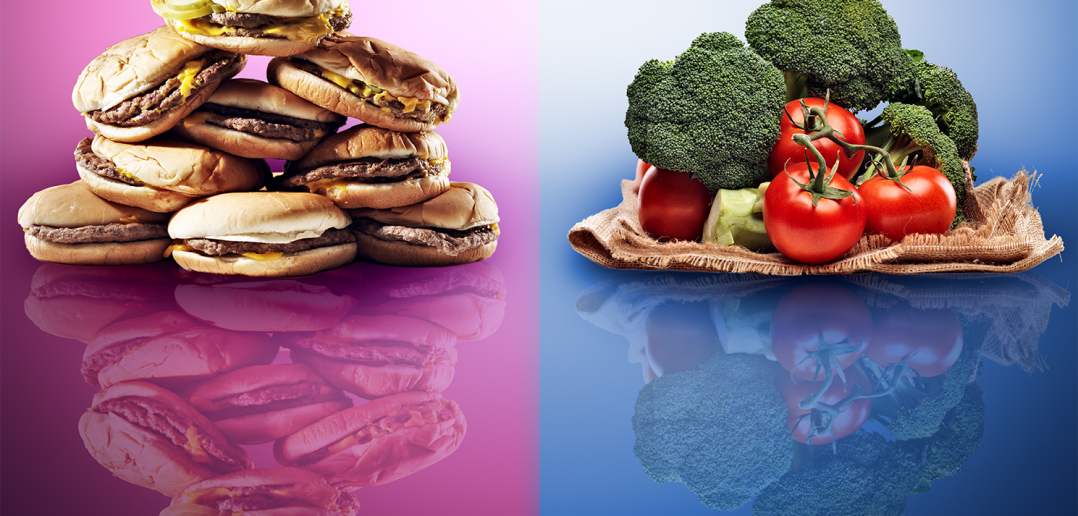
Processed or natural foods. You make your decision.
Processed food is everywhere, and it forms the bulk of many diets in the western world – there is a hugely profitable industry designed to persuade you that processed food is delicious and healthy, helping you to stay slim, and save precious time and money that could be spent on more important things.
Many processed foods display key words and phrases like ‘natural, organic, wholegrain, low fat and low calorie’ leading us to believe that we are doing our bodies a favour by eating them, but the result is we’ve lost touch with the importance of real food and cooking, and our health is suffering as a result.
So what is processed food? It comes in many forms, and includes anything that has been changed from its natural state. Processed foods that are widely available and found in many homes include tinned food like baked beans, all types of ready meals, pizzas, pies, pasta sauces, salad dressings, instant noodles, processed meats, biscuits, cereal bars, breakfast cereals, bread, crisps and confectionary.
Many of us rely on processed foods every day, partly because we have grown up eating that way, but also because processed foods are often very cheap, convenient and quick to prepare, which can feel like a godsend when we’re on a budget and busy. But it seems that in our search for convenience, we have forgotten that processed food isn’t really ‘food’ at all in many cases, which means bad news for our health, and here’s why.
Many processed foods display key words and phrases like ‘natural, organic, wholegrain, low fat and low calorie’ leading us to believe that we are doing our bodies a favour by eating them
Processed food on the whole tends to be low in nutrients and fibre, but high in additives, refined carbohydrates and unhealthy fats, which will leave you tired, bloated, overweight and feeling under par. Firstly, processed food tends to be stripped of nutrients like B vitamins, zinc, iron and magnesium, which we need for processes like energy production and immune function.

Processed food comes in all shapes and forms, but the most obvious is the ready meal
Many companies add synthetic nutrients to the finished product, but the natural nutrients present in real food are far better absorbed and utilised than the synthetic ones, which aren’t recognised by the body in the same way. Additionally, processed foods are low in natural plant fibre that helps us feel full and keeps our digestive system healthy.
They tend to contain harmful additives such as refined salt, preservatives, flavourings, colourings, emulsifiers, and artificial sweeteners. These additives may contribute to ill health such as cancer, Alzheimer’s disease, behavioural disorders and allergies and overeating.
Processed foods also contain lots of sugar, and so you may be eating far more than the recommended intake of sugar each day without even knowing it, which can contribute to obesity and diabetes. And finally you are likely to find refined, rather than natural fats and oils in processed foods. This can promote an imbalance in the diet, with far more omega 6 fats being consumed than omega 3, which may in part be to blame for the rise in conditions like cardiovascular disease and diabetes, to name just a few. In fact it’s no coincidence that rates of diabetes, obesity, cancer, heart disease, autoimmune disease, depression and anxiety have increased dramatically since these processed foods became mainstays of our diet.

It wasn’t until the agricultural revolution eleven thousand years ago that cereal grains and dairy products became an ever-increasing part of our diets
We only started eating processed foods very, very recently in our evolutionary history. We have spent millions of years eating foods found in nature, predominantly unprocessed meat, fish, nuts and seeds, vegetables and fruit.
It wasn’t until the agricultural revolution eleven thousand years ago that cereal grains and dairy products became an ever-increasing part of our diets, followed by the industrial revolution more recently, when processed foods became widely available. The trouble is, our bodies just haven’t caught up yet. While we are adapting very slowly, and in limited ways, to a diet heavier in cereal grains and dairy, we are still entirely mismatched with our reliance on processed food.
Processed foods also contain lots of sugar, and so you may be eating far more than the recommended intake of sugar each day without even knowing it
Processed foods are not all bad, and some can be enjoyed as part of a healthy diet. Frozen fruits and vegetables, for example, are a great, time-saving way to enjoy the benefits of consuming more plant foods, and in fact the freezing process locks in more of the nutrients often lost during transit and storage. Tinned fish, tomatoes, coconut milk and pulses are all useful store-cupboard staples that contain beneficial nutrients, and can be found without additives.
| Easy ways to reduce processed food in your diet… |
|---|
| Get junk food and unhealthy processed foods out of your kitchen – replace them with fresh foods. |
| Avoid boxed breakfast cereals – go for eggs, plain yogurt with nuts and berries, or smoothies (link from here to smoothie recipe). |
| Avoid fruit yoghurts, including low calorie and low fat – make your own with plain yoghurt and fresh fruit |
| Avoid squash, fruit juice or fizzy drinks – drink more water and herbal teas. |
| Avoid cereal or snack bars – swap for fresh fruit and raw nuts and seeds. |
| Avoid meat and fish coated in breadcrumbs or batter – choose fresh cuts instead. |
| Avoid low fat, low calorie or sugar-free foods – they are higher in additives like unhealthy fats, flavourings, sugar and artificial sweeteners. |
| Avoid margarine and refined oils in plastic bottles – swap for coconut oil, butter and extra virgin olive oil. |
| Use leftovers – if you manage to cook from scratch in the evening, make extra for lunch the next day. |
| Batch cook – spend an hour at the weekends making meals for the week ahead, like soup or curry, and freeze portions to use when you’re busy. |
| Invest in a slow cooker – five minutes spent prepping in the morning means a hot dinner that evening. |
| Remember healthy dinners can be quick – a salmon or chicken fillet with quinoa and green vegetables takes 20 minutes to prepare. |
| Avoid the inside aisles at the supermarket and spend more time around the edges – it’s there you will find the fresh fruit, vegetables, salads, meat and fish. |
| Be suspicious of food with a long shelf life – remember that good food is supposed to go off. |




